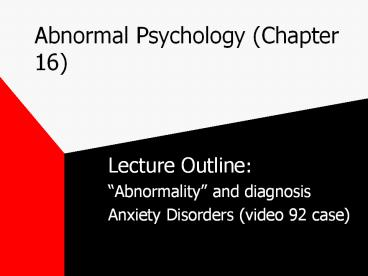Abnormal Psychology (Chapter 16) - PowerPoint PPT Presentation
Title: Abnormal Psychology (Chapter 16)
1
Abnormal Psychology (Chapter 16)
- Lecture Outline
- Abnormality and diagnosis
- Anxiety Disorders (video 92 case)
2
Quiz
- 40 questions, 2 points each (80 points)
- Chapters 11, 13, 16
- 13/14 questions/chapter
- 3-4 short answer questions (20 points)
- Get to class on time please!!!!!!
3
On the sheet of paper, list three things you are
afraid of
4
Abnormality
- Behavior is
- Statistically unusual
- Maladaptive or harmful behavior
- Labeled abnormal because of a violation of
cultural standards - Mental disorder as suffering, personal distress
- Historical examples of abnormal behavior
- psychosis demon possession, syphillis
- mentally retarded individuals midgets were
court-jesters - Salem witch trials girls may have ingested
ergot, LSD derivative
5
Salem witch trial
6
Models of abnormality
- Psychodynamic Intrapsychic conflict
- e.g., sexual abuse and conversion disorder
- Humanistic Oversensitivity to others
- e.g., alcoholism for social anxiety
- Behavioral Reinforcement/Punishment
- e.g., snake bite leads to snake phobia
- Cognitive Distorted thinking
- e.g., negative thoughts and depression
- Medical Physiological imbalance
7
Diagnosis DSM-IV
- Diagnostic and Statistical Manual, 4th Ed. (APA,
1994) - Axis I Clinical syndromes/ Mental disorders
- Axis II Personality and Disorders
- Axis III General Medical Conditions
- Axis IV Psychosocial and Environmental Problems
- Axis V GAF Scale (1low to 100high)
8
Problems with DSM
- Overdiagnosis, e.g., attention problems
- Power of diagnostic labels, e.g., person becomes
the disorder - Mental disorder vs. everyday problems, e.g.,
bad spellers? - Illusion of objectivity
- But diagnosis leads to treatment, categories lead
to empirical verification, and there is
cross-cultural evidence of various mental health
problems such as psychosis and depression
9
Anxiety Disorders
10
Symptoms of Anxiety
- Symptoms of anxiety
- Mood tension, apprehension and panic
- Cognitive catastrophe, concentration
- Somatic Sweat, pulse, dizzy, pounding
- Motor Tics, bite nails, pace, fidget
11
(No Transcript)
12
- Case examples of clients with anxiety disorders,
with emphasis on panic disorder (video 92)
13
Case example Social phobia
"I couldn't go on dates or to parties. For a
while, I couldn't even go to class. My sophomore
year of college I had to come home for a
semester." "My fear would happen in any
social situation. I would be anxious before I
even left the house, and it would escalate as I
got closer to class, a party, or whatever. I
would feel sick to my stomach--it almost felt
like I had the flu. My heart would pound, my
palms would get sweaty, and I would get this
feeling of being removed from myself and from
everybody else." "When I would walk into a room
full of people, I'd turn red and it would feel
like everybody's eyes were on me. Iwas too
embarrassed to stand off in a corner by myself,
but I couldn't think of anything to say to
anybody. I felt so clumsy, I couldn't wait to get
out."
14
Specific kinds of anxiety disorders
- Phobias Simple, social, and agoraphobia
- Panic Disorder Bouts of intense and
uncontrollable anxiety - Generalized anxiety disorder Chronic
- Stress Disorder PTSD
- Obsessive-Compulsive Disorder
- obsession unwanted impulses or thoughts
- compulsion uncontrolled repetitive act
15
Etiology (Cause) of Anxiety
- Psychodynamic External threats
- guilt after id-superego struggle
- Learning theory Classical conditioning
- sexual anxiety after unprotected sex
- Cognitive Anxious cognitions
- public speaking catastrophes
- Humanistic-Existential A gets a B
- Physiological Autonomic reactivity































